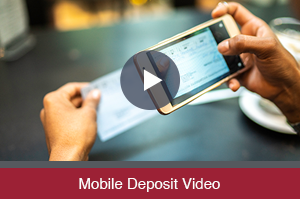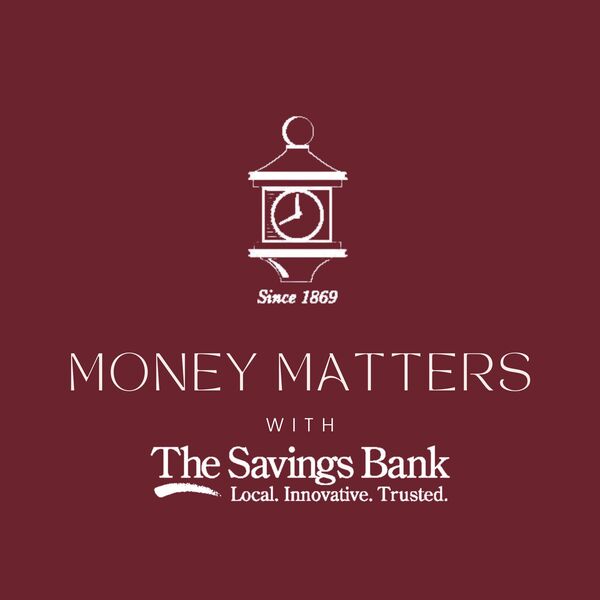Click here to listen to the episode.
Unlock the full potential of your business finances with expert insights from Mike Rosetti and Ed Fitzgerald, our commercial department gurus. This episode of TSB Money Matters serves as your key to understanding why separating personal and commercial accounts is crucial for precise tax and expense tracking. We delve into the multitude of online banking tools designed to work in harmony with platforms such as QuickBooks, ensuring you have round-the-clock access to your financial data and the ability to make informed decisions for your business. Whether you’re managing a fledgling startup or steering a large corporation, the type of business account you choose can greatly impact your bottom line. We navigate through the sea of options, highlighting how transaction volume and balances can guide your choice, and revealing how local community banks are offering a lifeline to small businesses with free checking accounts and generous transaction limits.
Imagine a world where proactive payment management becomes second nature, safeguarding your small business from the perils of fraud and cash flow crises. Our conversation with Mike and Ed puts a spotlight on the essential banking services and strategies that every small business owner should employ to stay vigilant. We stress the peace of mind that comes from trusting banking relationships, especially with community banks that have a keen understanding of the local business climate. Moreover, we celebrate the transformative power of referrals fueled by exceptional service, and how this can turn satisfied clients into powerful advocates for your business. Don’t miss out on the comprehensive advice shared in this episode, as it might just be the strategic edge your business needs to thrive in the competitive commercial landscape.
The TSB Money Matter Podcast is produced by The Savings Bank, a community bank headquartered in Wakefield, Massachusetts. The information presented is for informational purposes and should not be considered financial, legal or tax advice. Consult with a banker or financial advisor about your personal or business finances.
Transcript
Ally Houghton: 0:00
Welcome to the TSB Money Matters podcast, where we dive deep into the dynamic world of banking, finance and everything in between. I’m your host, allie Houghton, and we’ll tackle topics including landscapes of financial institutions, economic trends and the ever-evolving technology shaping the future of banking. In each episode, we’ll unravel the complexities of financial topics, bring you insightful interviews and industry experts, dot through leaders and innovators who are on the forefront of the banking industry. Whether you’re a seasoned financial professional or a budding entrepreneur, or someone simple curious about the forces shaping your financial world, this podcast is for you. Today we have Mike Rosetti and Ed Fitzgerald from our commercial department at the Savings Bank. Welcome.Ed Fitzgerald: 0:39
Thank you. Thank you for having us Today. We thought we would talk about business, bank accounts and services, just sort of what’s special about them, what’s different about them and so forth, and there isn’t anybody better to talk about that than Mike Rosetti. Thank you Ed.Ally Houghton: 0:57
Mike, what do you think some of the best benefits are for a commercial business that’s using commercial services at a bank?Mike Rosetti: 1:05
I mean first and foremost the business. Banking is a combination of a couple of things. One is, you know, we got your commercial accounts, we have our online system and then we offer services to assist in your cash flow of your monies.Ally Houghton: 1:25
Ed, anything you think you’d add there? Are there any other commercial services that you think would be something a small business should really look into when they’re first starting out?Ed Fitzgerald: 1:33
Well, I think the first thing is, as Mike mentioned, there’s things that attach to the account that you can link different services you can tie. If you accept credit cards, you can tie the payments through your account. You can do a variety of things like that. But one thing I think is important is just to identify sort of the differences between, you know, personal bank accounts and business bank accounts, because people, with doing their personal banking, they do it on their phone, they do it wherever they are and they may think that business is different from that. So maybe, mike, you give an example of some things that people do and have access to when they have maybe multiple accounts and they’re trying to access them on the business side.Mike Rosetti: 2:22
Yeah, I mean right now, at most banks, personal accounts and commercial accounts got to remain separate. You’re not really allowed, for certain IRS reasons, to co-mingle funds, so more than likely they’re separated. You know whether you both have an online system for each of your personal accounts and commercial accounts. But what we try to do overall is it’s a relationship, so you might have your personal accounts as a commercial business and you’ll probably have your commercial accounts. So what we try to offer is a little bit of flexibility with our online systems and stuff that there is the ability to, you know, move money, you know electronically whether it’s through ACH services, so you can kind of connect them all, because you know owning a small business can be all consuming, you know, in time and money and in energy, I think too. So what we try to offer is the services themselves will make it a little easier for you.Ally Houghton: 3:25
So this can really help a business work more efficiently.Mike Rosetti: 3:29
Yeah, I mean business. Online banking, mobile banking, is accessible 24-7. It’ll help you manage your cash flows for your business. It’s created with, you know, cash management services like Ed had spoke about. Like there’s merchant services, which is credit cards, there’s wire transfers if you got to get money same day to an outside vendor or to you know an outside account that you might have at another bank. It’s just a greater control and online services are all day long and accessible 24-7.Ed Fitzgerald: 4:05
So it’s a great time to try and, I think, choose it. Something to keep in mind is that, just like some folks are a little more sophisticated with downloading their information from their personal bank accounts Maybe they have quicken at home or something like or money, you know, some sort of software at home. On the business side, the counts are set up to integrate with QuickBooks so that if a business is keeping track of you, know all of their their costs, their expenses and their revenues and they can track those sources right through their bank account and have it all integrated into things like QuickBooks.Mike Rosetti: 4:42
So yeah, and it is best to keep your personal finances separate from your business finances For a couple of reasons. One is to track expenses I mean personally and professionally through your business and stuff. So, separating the funds and you know, paying taxes, which we all do, and you know usually on the commercial side you have to kind of keep track of what you’re gonna oh, at the end of the year you might pay quarterly’s, whatever it is you know that you’re looking to do. But keeping your personal expenses and your business expenses separate is key.Ally Houghton: 5:16
Is there a checking account that only one small business needs, or is there something? Is there an option that’s better, maybe, for a larger business compared to a smaller business?Mike Rosetti: 5:25
I think you know it’s, you know it’s about balances too, I mean for small business, and you know you might have, you know, small balances and stuff and you might not have that much activity. Most community banks offer some sort of business free checking account that will Limit the amount of transactions that you might have. It could be 150 transactions per month, which, believe it or not, is actually a fair amount to be offered on a free checking account. Some of the you know, larger businesses, corporations and stuff, they might have higher balances and then what we, what most banks, will try to do is, you know, leverage that relationship to offer services that they can extend out for free, based on a balanced relationship or a loan relationship. That, I’ll tell you, that’s very important to the banks too right.Ed Fitzgerald: 6:13
I mean, one of the one of the things is it all depends on what you need to have on a day-to-day basis in your account, and if you don’t need to maintain a lot of Money into a non-interest bearing account, you can set up a money market account associated with it and get a better rate of interest. If you’re, you know, set up that, you’ve got some. Your business is seasonal and sometimes of the year you have, you know, plenty of cash, and other times of the year you don’t have much cash. You might even be able to take care, put a short-term CD in when you’re doing well and then that way you’ve got that money pocketed away with some interest when you do need it at a different season.Ally Houghton: 6:58
Is there any other accounts, besides a checking account, that a business might want to think about?Ed Fitzgerald: 7:03
The only, the only thing that’s really more on the credit side than then on the on the checking side, it’s. It’s basically, you need to just make sure that you, as Mike indicated, you keep everything separate, because there’s nothing Worse than having muddled funds and then trying to figure it out at the end of the year. And then if you’re doing your own taxes, that’s bad enough. If you’re having a CPA, do your taxes, you can’t walk in with a pile of paper and just hand it to them and say Some of this is business and some of this is personal. And now Please, please, take care of this.Mike Rosetti: 7:38
I mean we’re all trying to maximize what interests you know we can make on accounts and stuff and businesses can utilize, you know, some of their reserves. I guess you want to say and look at maybe short-term options as CDs and pay a little bit higher interest that they might move money out of their operating account. We could. You know, banks extend on money market accounts to gain a little interest, but then they also have the ability to move money back and forth through the online system, you know. So if they have a cash flow need for making payments or bills, they could just move the money over from an interest-bearing account into the commercial checking account to pay their vendors and to move money.Ally Houghton: 8:22
How safe is a business’s money when they put it into a bank account?Ed Fitzgerald: 8:27
It’s a really good question to ask, especially because over the last few years we’ve seen some things happen with some banks and it might get people concerned. Some people get overly concerned and even keep money outside of a bank in places that they shouldn’t so. But as far as how safe it is, people should really be looking for two things, and one is that pretty much every registered bank in the United States has FDIC insurance, and that’s a federal insurance that covers up to $250,000 in year in every you know type of account that you have, and that’s usually enough for most people. It’s certainly enough for me.Mike Rosetti: 9:15
Mike, same with me. Okay, all right.Ed Fitzgerald: 9:17
So that’s fine. But if you’ve got a business and your business is growing and you’ve got larger deposits, you might want to consider the fact that in Massachusetts you’ve got the DIF, which is a depositors insurance fund, and that ensures everything that’s beyond what the FDIC covers. So if you’re someone who maybe does contract work for a government or for someone else and you’re getting significant amounts of money and you have over $250,000 that you’re trying to keep safe, it’s important to look at banks like the Savings Bank. There’s 72 different banks in Massachusetts that are participants in the DIF. So you know, look for the FDIC everyone has that but also look for DIF, because it’s sort of the extra insurance that you have on your accounts and other thoughts on that, mike.Mike Rosetti: 10:19
No, I absolutely agree with you. I mean you’ve got to position yourself. It’s, you know, protecting what you’ve already built up. So I think you know. Looking at banks community banks, normally cooperative banks they offer the extension of beyond the FDIC coverage.Ally Houghton: 10:37
And that covers commercial accounts as well as personal accounts. So if somebody wanted to bring in their personal account as well, they’d be covered there. Also, are there any rules and regulations that a business owner should be thinking about when it comes to transferring funds between business and personal accounts?Mike Rosetti: 10:53
I mean, as far as banking, you know, we don’t offer a platform in which you can transfer directly from one personal account to a business account. Like you said earlier, commingling of funds is kind of an IRS regulation, so I think that each person would need to talk to their tax advisor, as you know how they’re going to do business and how they’re going to track things expenses and transfers such as this.Ed Fitzgerald: 11:19
Right, I mean a good thing to just keep in mind is that if you’re the owner of business whether it’s a sole owner or partnership or whatever the situation is you have the right to access the funds from your business account. But you need to keep track of it. So it might be as simple as you know writing a check from your business to yourself personally, and then you know scanning it and depositing it into your personal account. Then there’s a record that you withdrew funds from the business and it just goes as an owner’s draw and it’s very forward and so forth.Mike Rosetti: 11:58
I mean normally speaking like business, commercial, true commercial accounts are set up under a federal tax ID number. So the separation to that, to your social security number, kind of defines how you’re going to run your business and how money can be transferred from your business to your personal account. A sole prop would be or schedule C type of business. You do have the ability because you’re under the same social security number and tracking that information is a little bit easier as far as you as a business owner.Ally Houghton: 12:32
What are some of the biggest mistakes you see business owners make when it comes to their commercial checking accounts?Mike Rosetti: 12:39
I think one mistake I would say is they. They need to pay attention on a daily basis to what’s going on in their accounts, debit credits coming in. It’s all about cash flow and you know some businesses are seasonal, you know, so they might have high amounts, you know, during credits coming in during the you know winter months or, vice versa, during the summer months. So I think it’s truly just paying attention to what you know expenses. You have what credits are coming in your accounts receivable. You know trying to keep below 60 days to make sure that money’s flowing in based on your needs. And then you always have, you know, you know the needs of, maybe a business line of credit for shortfalls you know that you might need, or a cash flow solution such as that.Ed Fitzgerald: 13:29
Yeah, I think that you know the kind of what Mike is focusing on is just be proactive about managing your payments, and there may be times where you have to do a little bit of shuffling, just like you might in your personal budget. You might have to do some shuffling and say, okay, this, I’ve got to pay this bill. It’s, you know, 45 days, you know past. I got to do this, this one, I’ve got a little bit of time, and so you have to manage it carefully. And one thing that I even know that’s not the focus of our topic today that you have to watch is when Mike says look at what debits and credits are hitting your account on a particular day. There’s so much fraud that can happen that you know you do want to question anything, even if it’s a $20 item that you don’t recognize, because it could be an indication of something that’s happening, that someone got some a hold of some of your information. So it is really important to be on top of it every day.Mike Rosetti: 14:30
Yeah, and that’s resources at the bank. You know there are fraud prevention tools, but the best thing you can ever do is look at your account every day. I truly believe that.Ally Houghton: 14:42
And what’s the best thing? If somebody does see fraud, what’s the best way to get that resolved right away?Mike Rosetti: 14:46
I think just contact your bank. You know what I mean and we can walk you through steps. You know, as far as you know what you know, positioning, what the fraud, how it happened. But then also you know we can do certain things on account so money won’t leave your account and look at it as each item that does come into the account to take money out. We can contact the business or personal person to see if they want to allow that until we get the account changed over to a new account.Ally Houghton: 15:19
What would you say in your mind are the top three commercial services that every small business should start off with?Ed Fitzgerald: 15:27
I would. What first thing I would say is make sure that you set up your accounts with overdraft protection, because no matter how well manage your business is, you might accept the check. That is, it takes longer to clear for some reason and you write a check on it. So you want to make sure you have overdraft protection, so that I think that’s that’s essential. The other thing is to look at a business line of credit that you can integrate, you know, with your account, so that if the account you know dips below a certain amount, that you can access other funds, even if it’s temporary. You might borrow on it for two weeks and then pay it back when you get your own clients paying you. But so I think that’s the second thing and I think the third thing is just sort of bank with somebody that you feel that you can trust and it’s reachable.Mike Rosetti: 16:24
So that’s that’s absolutely the way I look at it to is know some bank that gets to know you. Community banks are involved in the community and they get to know the people in the community how they do business. And I think when you look at it, you’re usually getting somebody to speak to at the other end of the line when you call into the bank, or somebody knows who to get in contact to help you out.Ed Fitzgerald: 16:50
Right Problem resolution and quick problem resolution it’s really the key to being satisfied with your banking relationship Absolutely.Ally Houghton: 17:02
So, as we wrap up, is there any final advice or information that you would give a business owner out there that’s looking to set up a new account or add some financial products onto their account that they already have?Ed Fitzgerald: 17:16
The only thing I’m going to say and this is from my decades of experience don’t tell anyone but bank with someone that you can see and someone whose operations you can see. There’s a lot of online services these days where you can have your money in an account that’s in another state, another country, somewhere else, and, without actually having someone that you could ever go and see and touch and feel and meet, you can really sort of lose track and lose touch and then when there’s a problem, you don’t know who to talk to. So that’s the home, I guess, from a wrap-up perspective. I don’t know, mike, anything else you can think of.Mike Rosetti: 18:02
I believe that you just got to have a good feel for everything. I would just bring questions. If you’re opening up an account, do a little investigation first. Maybe call somebody, a representative that might handle you and get a feel for who you’re going to be dealing with and how you operate. I know a referral from a friend or another business acquaintance that has had success with a certain bank always works well too. I think we all work on referrals and I think if you give great service, people are going to tell people oh, he’s great, he gets back to you. That’s what you really want. When you’re in need, you just want to be able to pick up the phone or contact somebody and just get it resolved as quick as possible.Ally Houghton: 18:50
Well, thank you. I want to thank you both for joining me today and I really hope that any commercial business out there that’s looking for some different products or services would look at some small banks, see what they have to offer and see if that works well for them. So, thank you both and thank you to everybody listening, and we will be back soon with another edition of TSB Money Matters.







